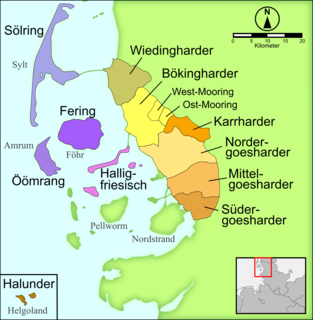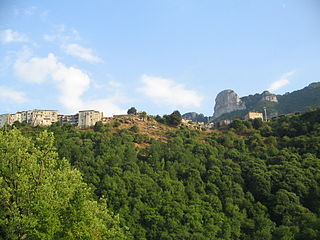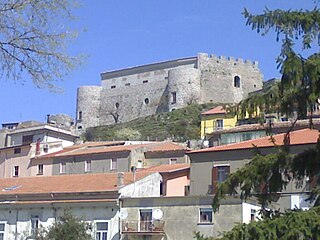In linguistics, grammatical gender is a specific form of noun class system in which the division of noun classes forms an agreement system with another aspect of the language, such as adjectives, articles, pronouns, or verbs. This system is used in approximately one quarter of the world's languages. In these languages, most or all nouns inherently carry one value of the grammatical category called gender; the values present in a given language are called the genders of that language. According to one definition: "Genders are classes of nouns reflected in the behaviour of associated words."

Fering is the dialect of North Frisian spoken on the island of Föhr in the German region of North Frisia. Fering refers to the Fering Frisian name of Föhr, Feer. Together with the Öömrang, Söl'ring, and Heligolandic dialects, it forms part of the insular group of North Frisian dialects and it is very similar to Öömrang.

Catalan grammar, the morphology and syntax of the Catalan language, is similar to the grammar of most other Romance languages. Catalan is a relatively synthetic, fusional language.

Neapolitan is a Romance language of the Italo-Dalmatian group spoken across much of southern Italy, except for southern Calabria, southern Apulia, and Sicily, as well as in a small part of central Italy. It is not named specifically after the city of Naples, but rather the homonymous Kingdom that once covered most of the area, and of which the city was the capital. On October 14, 2008, a law by the Region of Campania stated that Neapolitan was to be protected. While the term "Neapolitan language" is used in this article to refer to the language group of related dialects found in southern continental Italy, it may also refer more specifically to the dialect of the Neapolitan language spoken in the Naples area or in Campania.

The Ghomara language is a Northern Berber language spoken in Morocco. It is the mother tongue of the Ghomara Berbers, who total around 10,000 people. Ghomara Berber is spoken on the western edge of the Rif, among the Beni Bu Zra and Beni Mansur tribes of the Ghomara confederacy. Despite being listed as endangered, it is still being passed on to children in these areas.

Buccino is a town and comune in Campania in Italy, in the province of Salerno, located about 700 m above sea level.

The Spanish language has nouns that express concrete objects, groups and classes of objects, qualities, feelings and other abstractions. All nouns have a conventional grammatical gender. Countable nouns inflect for number. However, the division between uncountable and countable nouns is more ambiguous than in English.
Western Lombard is one of the main varieties of Lombard, a Romance language spoken in Italy. It is widespread in the Lombard provinces of Milan, Monza, Varese, Como, Lecco, Sondrio, a small part of Cremona, Lodi and Pavia, and the Piedmont provinces of Novara, Verbano-Cusio-Ossola, the eastern part of the Province of Alessandria (Tortona), a small part of Vercelli (Valsesia), and Switzerland. After the name of the region involved, land of the former Duchy of Milan, this language is often referred to as Insubric or Milanese, or, after Clemente Merlo, Cisabduano.

The Tanagro (Tanàgro) or Negro is a river of the Province of Salerno, southwestern Italy. It rises in the Vallo di Diano and is a tributary of the Sele River. In ancient times it was known as Tanager.

Auletta is a town and comune in the province of Salerno in the Campania region of south-western Italy.

Castelcivita is a town and comune in the province of Salerno in the Campania region of south-western Italy.

Ottati is a town and comune in the province of Salerno in the Campania region of south-west Italy. As of 2011 its population was of 680.

Petina is a town and comune in the province of Salerno in the Campania region of south-western Italy.

Postiglione is a town and comune in the province of Salerno in the Campania region of south-western Italy.
Iraqw is a Cushitic language spoken in Tanzania in the Arusha and Manyara Regions. It is expanding in numbers as the Iraqw people absorb neighbouring ethnic groups. The language has a large number of Datooga loanwords, especially in poetic language. The Gorowa language to the south shares numerous similarities and is sometimes considered a dialect.

The Parco Nazionale del Cilento, Vallo di Diano e Alburni is an Italian national park in the Province of Salerno, in Campania in southern Italy. It includes much of the Cilento, the Vallo di Diano and the Monti Alburni. It was founded in 1991, and was formerly known as the Parco Nazionale del Cilento e Vallo di Diano.

European route E 847 is a European B class road in Italy, connecting the cities Sicignano degli Alburni – Bernalda.















